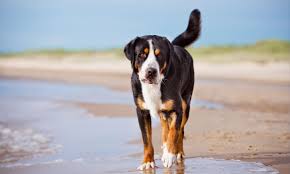
Greater Swiss Mountain Dog
Conditions of detention
Greater Swiss Mountain Dogs are best suited to homes with ample space, such as those in rural or suburban areas. They need room to move and exercise.
Useful Fact: These dogs do not do well in apartments or small living spaces due to their size and exercise needs.
Nutrition and diet
A balanced diet of high-quality dog food, appropriate for their age, size, and activity level, is crucial.
Useful Fact: Splitting their daily food intake into two or three meals can help prevent bloat, a condition to which they are prone.
Health
The Greater Swiss Mountain Dog is generally a healthy breed but can be susceptible to conditions like hip dysplasia, elbow dysplasia, and bloat.
Useful Fact: Regular veterinary check-ups and maintaining a healthy weight through proper diet and exercise are important for preventing and managing health issues.
Grooming and care
The Greater Swiss Mountain Dog has a dense double coat that is tricolored (black, rust, and white). Their coat requires regular grooming, typically weekly brushing, to remove loose hair and reduce shedding.
Useful Fact: They shed year-round but have heavier shedding periods twice a year, during which more frequent brushing is necessary.
Education and training
Intelligent and eager to please, Greater Swiss Mountain Dogs respond well to positive reinforcement training methods. Early socialization and consistent training are essential.
Useful Fact: Due to their size and strength, training should focus on good manners and obedience from a young age to ensure they are manageable as adults.
Toys and entertainment
Sturdy toys, such as heavy-duty chew toys and large balls, are suitable for Greater Swiss Mountain Dogs. Interactive toys can also keep them mentally stimulated.
Useful Fact: They enjoy activities that engage their natural herding and working instincts, such as pulling carts or participating in agility exercises.
Safety
A secure yard with a sturdy fence is important to keep them safe. They should always be on a leash during walks to prevent them from wandering off.
Useful Fact: Given their size and strength, using a strong, reliable leash and harness is important for safe walks and outdoor activities.
Accessories
Durable collars, leashes, and harnesses are necessary for handling their size. Comfortable bedding and appropriate travel crates are also beneficial.
Useful Fact: Elevated feeders can help reduce the risk of bloat by promoting a more natural eating posture.
Socialization
Early socialization with other dogs, animals, and people is crucial to develop a well-rounded temperament. Greater Swiss Mountain Dogs are generally friendly and enjoy being part of the family.
Useful Fact: Regular exposure to different environments and social situations can help prevent shyness or aggression.
Travel and Transportation
Greater Swiss Mountain Dogs usually travel well, especially if accustomed to car rides from a young age.
Useful Fact: Secure travel crates or dog seat belts enhance safety and comfort during travel.
Behavior and psychology
Known for their gentle and friendly nature, Greater Swiss Mountain Dogs are also alert and protective, making them excellent watchdogs. They require companionship and can suffer from separation anxiety if left alone for extended periods.
Useful Fact: Regular exercise, mental stimulation, and positive social interactions are key to preventing boredom and anxiety-related behaviors.
Legal aspects
Owning a Greater Swiss Mountain Dog may be subject to local pet laws and regulations, including licensing and leash laws.
Useful Fact: Familiarize yourself with local regulations and ensure your Greater Swiss Mountain Dog is properly licensed and identified.


